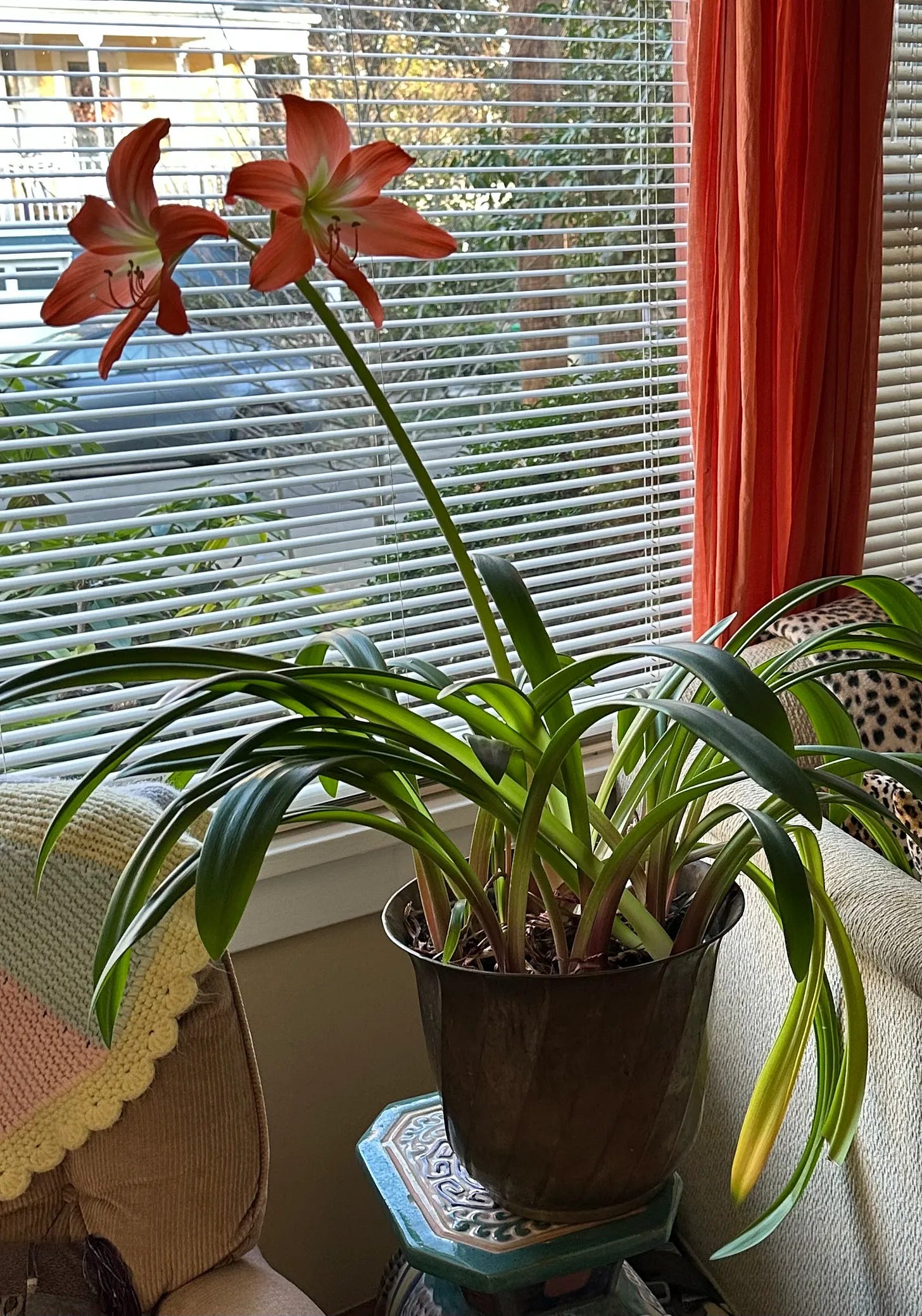Check in
Riding the bus for free
February 4 was Rosa Parks Day and all the transit in Portland—buses, trains, trams—was free. Many drivers crafted their own handmade signs.
Where are we now?
The actions of our present government are threatening to our way of life, and so far they are proceeding relentlessly. It is easy to become mired in disbelief at what is happening, and frozen in our inability to do anything about it. What can we do?
From one vantage point, we can’t do anything. Still, we must persevere in being the authentic persons that we are.
And some resources have always been there for humans faced with difficult challenges.
Prayer
We pray for clarity, for understanding, for forgiveness, for courage, for forthrightness, for speaking truth. All these are things we will not concede.
Meditation
Challenge moves us inward to the strength of our knowing and intuition. We move calmly toward calmness. We know who we are, yet we don’t know what to do. We are open to guidance.
Who are we?
We are the ones who witness. We are strong enough to bear the anguish. We are called to step in and help when we can, when people we know and love, as well as strangers, need us.
The balm of writing
I’ve read somewhere that writing well is “the best revenge.” I don’t know about that, but I can attest that writing (or any sort of creation) is a great cure. It is a balm that will ease your heart.
As I do my writing exercise each morning, I reach within, probe my feelings, and find something valuable to pull from inside. This helps me to cope.
Are you frustrated and despairing, dear ones? You might try to write about it. Pour your heart onto the page. You can’t fix the world, but bit by bit you can strengthen your place in it. Writing is power.
Moving on . . .
Today I am writing about lists: making them and checking them and trying to live by them and mostly failing. But first, football.
Football
Tomorrow, I may relax and rest with the Super Bowl. I seldom watch that game, but this season I’ve been enjoying the playoffs.
I’m not a fan but I like to watch football.
I enjoy the camerawork. Being able to zoom in on the huddle and zoom out for the play. Watching the players whap one another on the helmet in triumph or look so haunted in the last minutes when they know they are going to lose.
I can multitask, knitting or piecing quilt blocks or cooking, drawn back to the game when an increase in crowd noise indicates a big play. Then I can watch the instant replay.
Well, actually, I do watch most of the action.
I like the ambiance of the crowd noise and how the sense of crisp fall/winter air fills the living room.
Football is complex. I know just enough of the way the game is played to enjoy the strategy. I’m amazed every time a receiver catches a ball. It can’t be easy.
I’ll pick a team to root for at the outset because I like their goofy uniforms or their sense of purpose. Usually that team loses. Other than that, I’m not invested. I don’t follow a team.
I’ve forgotten momentarily who is playing tomorrow. Oh, yes, the Chiefs . . . and some other guys. Maybe I’ll tune in.
I know about sacking
A clever TV ad for ATT Guaranteed features former NFL stars trying to deal with real life. Quarterback Tom Tebow fumbles his car keys, for instance. And DeMarcus Ware, a linebacker with an impressive record of sacking QBs, is shown trying fruitlessly to open a product bag (sack).
Hey, I know how to do that. I wish someone would clue DeMarcus in on the simple solution. That is to wet your fingers. Then rustle the top of the bag and it will open easily. I thought everyone knew this technique, but I see folks struggling with plastic bags all the time.
Lists
Keeping track
How we keep track of information has changed radically. Remember the address book, well-thumbed pages falling out, perhaps held together with a rubber band? We kept notes on memo pads, steno notebooks, scrap paper, index cards. Then someone at 3M invented Post-It notes. Then someone invented the microcomputer, followed by plenty of apps to keep track of . . . anything.
It’s so easy to find, create, store information. We can sweep it under the rug of our computer, so it isn’t cluttering our real desktops.
Phooey. Tell me you don’t have handwritten lists on your real desktop, in your purse, on the fridge.
Why a list?
I keep lists. Lots of lists. Mostly so I can ignore them.
Still, some lists you can’t do without
Books to read, movies to see, shows to watch
To-dos
Shopping
Contacts
Recipes
Goals
Books
I keep a list called “Why This Book,” where I list books I might like to read. I note who suggested the book. It’s hard to keep this current.
LibraryThing.com is a great place to track your library. It is extremely easy to use. Every time I acquire a book, I scan the bar code into LibraryThing and all the information about the book is available whenever I want it.
Food
From time to time, when I have time (like, hardly ever) I keep a bare-bones journal I call “eatitlog.” I make a lot of meals with odd ingredients, like labne with olive oil and dried olives, or homemade kimchi and sliced Meyer lemons sprinkled with Tajin seasoning. Sometime I like to look back on what I was eating.
Lists about writing
I keep track of what I’ve written or what I want to write about in DevonThink, a database hungry for new material. Here are some of many baskets I maintain there:
Write About Me (WAM): snippets and ideas to expand into essays
Poems, by me and others
Quotations that I find while reading
Writing fiction, writing nonfiction, writing scripts . . .
Morning Pages, daily writing exercises. There are thousands of these.
Recipes
Other places to keep lists
Besides my database:
Bullet journal. The one I carry with me to jot down ideas
Google Keep. A place for shopping lists and things I see from the bus that I want to check out
Omni Outliner. A sometimes useful tool for arranging ideas, but mostly I write in DevonThink nowadays.
Schedules
I’ve been making schedule lists since at least junior high. Some of them are attempts at morning routines. They work for less than a day on average. Something always comes up. I am too creative and too flexible for it not to.
Lists
Everything you ever meant to do, Plans before the cobwebs stole their power, What to buy, or read or listen to, Your life in columns, ready to devour. Check off the boxes, urgently or not, You don’t have to think if you just write things down. Move along mindlessly, you have a list. It’s there to remind you. Just don’t forget to look at it.
List is also a verb

Listing means leaning to one side. Which side is overweighted in my life? The creativity side, I would hope. I list toward worthy pursuits like writing and noticing, or working with fabric and yarn. I’m leaning away from unworthy activities like too much TV and social media.
In the center, the fulcrum: rest and relax. Stop worrying about what you may not be accomplishing. Just be.
In person
In her fine book Super-infinite: The Transformations of John Donne, Katherine Rundell tells us that crowds followed Donne, an Anglican minister, as he preached from church to church in London. His most famous sermon-like poem begins, “No man is an island.” This poem ends by exhorting us:
Therefore, send not to know For whom the bell tolls, It tolls for thee.
Rundell writes:
His congregation—merchants, aristocrats, actors in elaborate ruffs, the whole sweep of the city—came to his sermons carrying paper and ink, wrote down his finest passages and took them home to dissect and relish, pontificate and argue over.
Imagine writing down Donne’s words like this—right there, on the fly, as he was delivering them! In those days you couldn’t just dictate into your cell phone. You’d have to take paper or parchment and something to write with. A quill pen and ink? Cumbersome. Perhaps a servant could hold the inkwell. . . . Pencils weren’t in common use until later in the 17th century. Maybe charcoal? Any historians out there who might know how someone could achieve this in the mid-17th century? Leave a comment, please. And thank you.
I’m so impressed by the immediate nature of Donne’s fans tracking the famous man’s speeches like this. He was right there, speaking to them. John Donne was the rock star of his day, only much more approachable than the stars of later eras. No flashing lights and pyrotechnics required. No purchase of tickets. Just pure Donne, to the delight of his audience.
Checkout
Full up
My life is so full, If I tip it, it will spill All my good intentions, A waterfall of loss. Ideas slide into oblivion, Jostled aside by new ones. Visions crowd my waking, Dreams crowd my visions. The glass is full, now drink it— The wine of knowledge and art. How my heart yearns for completion. Beyond that, I’m grasping at rain.
Flowers
A friend gave me and Robert an amaryllis. It is blooming profusely at the same time Robert’s 80-year-old amaryllis is putting out its own orange blossoms.

—30—
This is my work
I hope you are enjoying Becoming, which I publish every Saturday evening. This is my 130th weekly posting.
I really appreciate paid subscribers. They are telling me my weekly words are worthwhile. A yearly subscription is less than $1 a week.
Every time someone likes a post or leaves a comment, I get an email notification; that gives me a chance to remember and cherish that individual. If you think others would like this newsletter, hit re-stack (the interlocking arrows at the top of this item) or share. Restack puts the posting on the top of the heap, where more readers may see it.
Also know that on PayPal, you can tip me in $5 increments





I definitely have to wet fingers to open bags. That amaryllis is more than 50 years old? That's amazing, truly. I hope you enjoyed the game. It wasn't the most interesting of games, I think.
An 80-year-old amaryllis? Never heard of such a thing. I'm deeply impressed.